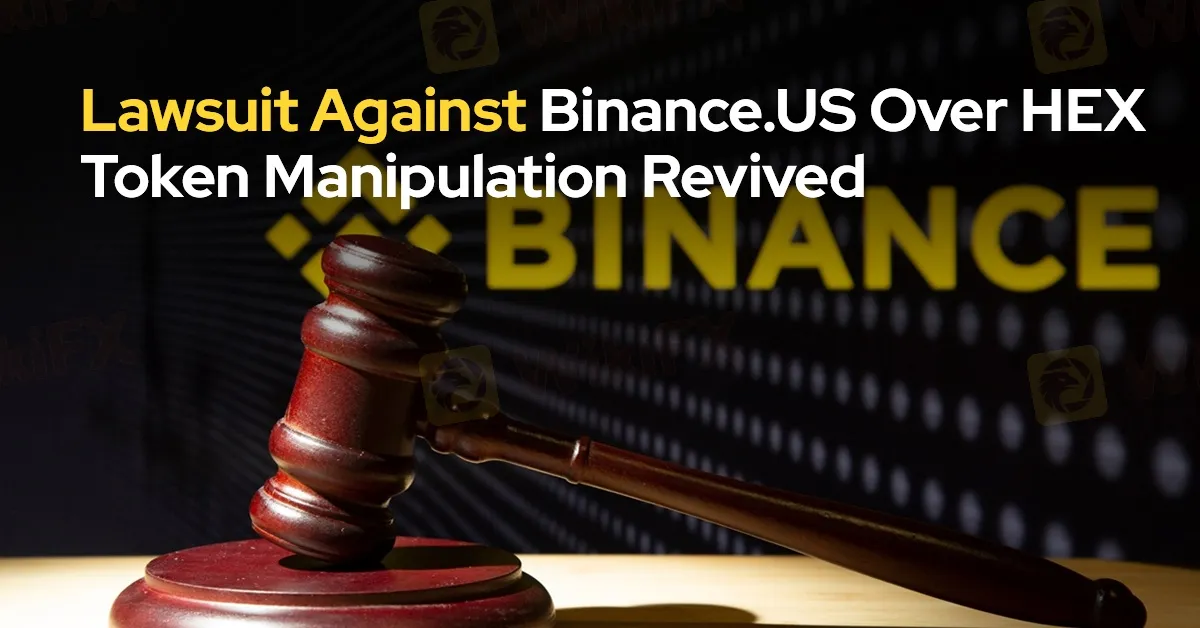简体中文
繁體中文
English
Pусский
日本語
ภาษาไทย
Tiếng Việt
Bahasa Indonesia
Español
हिन्दी
Filippiiniläinen
Français
Deutsch
Português
Türkçe
한국어
العربية
Lawsuit Against Binance.US Over HEX Token Manipulation Revived
Abstract:A U.S. appeals court has revived a class-action lawsuit against Binance.US, which accuses the cryptocurrency exchange of manipulating the HEX token’s price, reopening a legal battle involving significant financial claims and regulatory scrutiny.

A recent decision by a U.S. appeals court has brought new attention to a class-action lawsuit against Binance.US, alleging that the cryptocurrency exchange manipulated the price of the HEX token. On August 12, the Ninth Circuit panel overturned an earlier dismissal by a district court, allowing the case to proceed. This ruling is significant as it challenges the previous court‘s determination that there was not enough connection between Binance.US’s actions and the state of Arizona to justify the lawsuit.
The case, initially filed by Ryan Cox in 2021, accuses Binance Capital Management and Binance.US of manipulating the HEX tokens ranking on CoinMarketCap, a cryptocurrency tracking platform owned by Binance. Cox alleges that this manipulation resulted in HEX trading at a lower price compared to other Binance cryptocurrencies, which were given higher rankings.

The district court had dismissed the lawsuit in February 2023, ruling that Cox had not demonstrated a direct link between Binance.USs activities and the alleged price manipulation in Arizona. The court had applied a standard for “sufficient minimum contacts” that the appeals court found to be incorrect. The Ninth Circuit panel argued that Binance.US had significant enough connections with the broader U.S. to establish personal jurisdiction, even if the direct link to Arizona was not clear.
The Ninth Circuit's decision means that Cox's allegations of price manipulation are now recognized as valid, and the case will continue through the legal system. This development could have broader implications for how courts handle cases involving cryptocurrency exchanges and their practices.
In a related matter, the HEX token, which was introduced by Richard Heart in December 2019, is facing its own legal challenges. On July 31, 2023, the SEC filed a lawsuit against Heart, accusing him of breaching federal securities laws and defrauding investors of at least $12.1 million. The SEC alleges that Heart used investor funds for personal luxury purchases, such as a 555-carat diamond, expensive watches, and high-end vehicles.
The HEX token itself has seen a dramatic decline, currently trading at $0.004, a significant drop from its peak of $0.51 in September 2021. This decline underscores the volatility of cryptocurrency investments and highlights the ongoing legal and financial challenges facing those involved in the sector.

Disclaimer:
The views in this article only represent the author's personal views, and do not constitute investment advice on this platform. This platform does not guarantee the accuracy, completeness and timeliness of the information in the article, and will not be liable for any loss caused by the use of or reliance on the information in the article.
Read more

Bybit Shuts Down NFT Marketplace Amid Crypto Market Downturn
Bybit announces the closure of its NFT marketplace, citing efforts to streamline offerings. Discover the latest trends in the declining NFT market and its shift to utility-based growth.

Galaxy Digital Settles $200M in Luna Token Manipulation Case
Galaxy Digital pays $200M to settle Luna token manipulation probe by NY regulators, linked to TerraUSD’s 2022 crash, impacting crypto market stability.

Vanuatu Passes VASP Act to Regulate Crypto and Digital Assets
Vanuatu's new VASP Act regulates crypto businesses, enforcing strict licensing, AML/CFT compliance, and investor protections.

Blockchain Decentralization: Empowering a Trustless Future
In recent years, blockchain technology has rapidly evolved from a niche innovation behind Bitcoin into a transformative force across industries. At its core, blockchain decentralization refers to the distribution of authority and decision-making away from a central entity and into the hands of a distributed network of participants. This shift redefines how data is stored and verified and paves the way for trustless, transparent, and resilient systems that challenge traditional centralized models.
WikiFX Broker
Latest News
Exposing the Top 5 Scam Brokers of March 2025: A Closer Look by WikiFX
Gold Prices Climb Again – Have Investors Seized the Opportunity?
Webull Launches SMSF Investment Platform with Zero Fees
Australian Regulator Warns of Money Laundering and Fraud Risks in Crypto ATMs
The Withdrawal Trap: How Scam Brokers Lure Victims into Paying More
FCA to Investors: Think Twice Before Trusting These Brokers
Trump\s tariffs: How could they affect the UK and your money
Trump gambles it all on global tariffs he\s wanted for decades
HTFX Spreads Joy During Eid Charity Event in Jakarta
How Will the Market React at a Crucial Turning Point?
Currency Calculator







